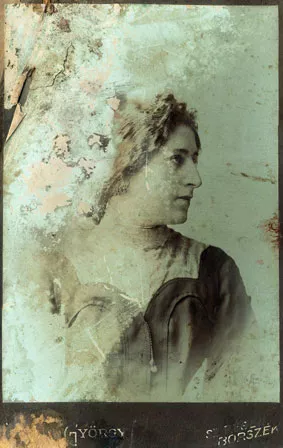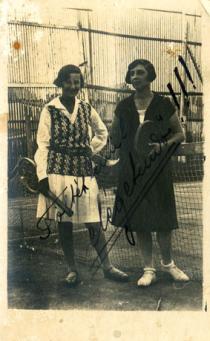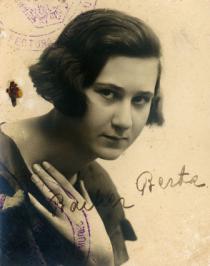Helen Bacher
This is a photo of my mother, Helen Bacher, when she was a girl. She was Helen Alschuch that time. It is written that this photo was taken by the photographer of Borszek-Szaszregen, in 1904. I think she got married in 1905. I don’t remember this dress of her. I remember only the usual dresses, when she wore customary dresses. My mother didn’t wear bathrobes either. She always had dresses you could button up all the long. We never wore bathrobes and slippers. Slippers only from the bedrooms to the bathroom, she came out from the bathroom dressed up already. Well, I learnt this from my mother.
My mammy attended the convent for eight years in Gyergyoszentmiklos. She also finished two years of I don't know what, so she qualified as a teacher. Of course she had a Hungarian qualification. She said then 'I'll go to look for a job.' She went home, my grandfather lived a few kilometers from Gyergyovarhegy, on the hillside, in a completely Romanian village. Only an Armenian family lived there, and there was a teacher in that family too, who was commuting to Ditro [today Ditrau], to Gyergyoszarhegy [today Lazarea], and the husband worked in a factory, he was a clerk. My grandfather was desperate that a daughter would go to a foreign place to work, to Marosvasarhely or somewhere else. Back then it was something inconceivable. And my grandpa wouldn't let her go. My mother was crying, and she said: 'Why did you let me learn then?' He answered 'Listen to me! - that's how my mother related it to me - If you learnt well the lesson in Hungarian, and you speak Romanian perfectly, here is a four grades primary school - there was a Romanian school in Gyergyoalfalu [today Joseni] -, pay a visit to the schoolmaster, and ask him if he could employ you.' My mother had no choice, she went there, they employed her, and she was teaching there. There was a schoolmaster, a teacher and a Romanian teacher, so there was room for my mammy too, because there were quite a lot of children. So mammy was teaching in Romanian, but not for long, since dad came and married her. And in older times it wasn't fashionable that a woman who got married went to work. My father didn't let my mother work as a teacher, he used to say: 'What's in your mind? What would people say, that I can't support a wife?'
There was a difference of age of 6 years between my brother [1905] and me. My mother didn't want more children, and she already was so modern and clever - though there weren't contraceptive pills yet. My father wanted a girl. My mother withstood it for 6 years, then she gave up, and she became pregnant, that's how I was born after 6 years. A scene took place then, because they say I weighted 5 kilos and I was wonderful, and when they placed me into my father's arms, he went to my mother's room and told her: 'Well dear, with all this pain why didn't you born one more such beautiful child?' And my mother got so angry, that she didn't talk for three days. Since she was struggling for three days. There was a midwife at a village, it turned out at the end that she wasn't a midwife in fact. She was struggling for three days, but there weren't any problems.
Mammy was a housekeeper. They observed all the high days according to the Jewish religion. Friday morning mammy cooked the Friday dinner - what she prepared depended if it was summer or winter - and she cooked for Sabbath as well. Friday evening we had fresh dinner - for us [Jews] every holiday starts in the evening, and it ends next day, when the star rises. For example we liked fish very much, and Friday evening we had fish in aspic, tee for those who wanted and challah. The challah wasn't milk loaf, but dough kneaded with water. The difference was that the challah was made of whites, and it was twisted to make it elongated. We called this challah in the family. They baked two challah for an ordinary Sabbath. And the custom was that they put the challah one next to the other, it was covered with a tablecloth, my father took it down and cut it into slices, and he gave a small piece for everybody. That's how it started. But we didn't salt it. We dunked it once, at Shavuot. But not into salt, but we had honey in a little pot, daddy gave everybody a bit. It is a symbol, so that the new year would start sweet and well. We were a small family, four maximum, as my brother didn't come home every time.
































